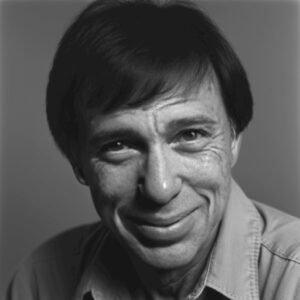
Born amid the noisy optimism and lingering shadows of a post-depression Brooklyn on July 16, 1928, Robert Sheckley grew up with a city’s nervous heartbeat beneath his stories. His early life wasn’t marked by grand estates or academic privilege; rather, it unfolded amidst the bustling energy and subtle anxieties of a city rebuilding after hardship. This backdrop—a world simultaneously promising progress and hinting at underlying fragility—would become a recurring theme in his work, a quiet tremor beneath seemingly polished surfaces.
Like many of his generation, Sheckley didn’t arrive fully formed as a science fiction author. He began his career writing for pulp magazines, honing his craft with detective stories and westerns before turning his gaze towards the stars. But even then, a distinct voice was emerging: one that favored psychological nuance over technological spectacle. While contemporaries like Isaac Asimov built empires of robots and galactic federations, Sheckley focused on the individual caught within systems—often absurd, frequently menacing, always human.
He burst onto the science fiction scene in the 1950s with a series of short stories that felt … different. They weren’t about conquering new worlds; they were about surviving the ones already here, or more accurately, surviving the subtle shifts within them. His tales often featured ordinary people facing extraordinary circumstances, their agency eroded by bureaucracy, technology, or simply the relentless march of societal control. This was a departure from the space opera and optimistic futurism that dominated much of the Golden Age. Where Clarke envisioned grand leaps forward, Sheckley saw the potential for insidious stagnation.
Consider his story, “Watchbird,” published in 1953. It’s not a tale of interstellar war or alien invasion. Instead, it presents a chillingly plausible scenario: man monitored constantly by an omnipresent surveillance system, his every action scrutinized and subtly manipulated. The horror isn’t in what is done to him, but the quiet erosion of his freedom, the insidious comfort of being watched. This story, like so many others from Sheckley’s pen, felt less like prediction and more like a dark reflection of anxieties already simmering beneath the surface of post-war America.
Sheckley’s style is often described as minimalist, even laconic. He didn’t indulge in lengthy descriptions or elaborate world-building. Instead, he favored sharp dialogue, unsettling premises, and an almost clinical detachment that amplified the stories’ emotional impact. This economy of language, coupled with his focus on psychological realism, set him apart from authors like Ray Bradbury, whose work often relied on poetic imagery and nostalgic sentimentality. While Bradbury painted melancholy reveries of lost innocence, Sheckley diagrammed our complicity in systems designed to quietly undo us.
His influence wasn’t always immediately apparent in direct imitation. Rather, it seeped into the genre, shaping a more cynical, introspective strain of science fiction. Authors like Philip K. Dick—himself a master of paranoia and societal critique—acknowledged Sheckley’s impact, recognizing a kindred spirit in his exploration of identity, control, and the blurring lines between reality and illusion.
Sheckley continued to write prolifically throughout his life, exploring themes of alienation, consumerism, and the search for meaning in an increasingly automated world. He wasn’t interested in offering solutions; he was a cartographer of quiet apocalypses, meticulously charting the subtle ways humanity might lose itself, not with a bang, but with a whimper—or perhaps, simply by accepting the watchful gaze. He passed away on December 9, 2005, leaving behind a body of work that continues to resonate, reminding us that the most terrifying futures are often those we build for ourselves, one carefully monitored moment at a time.